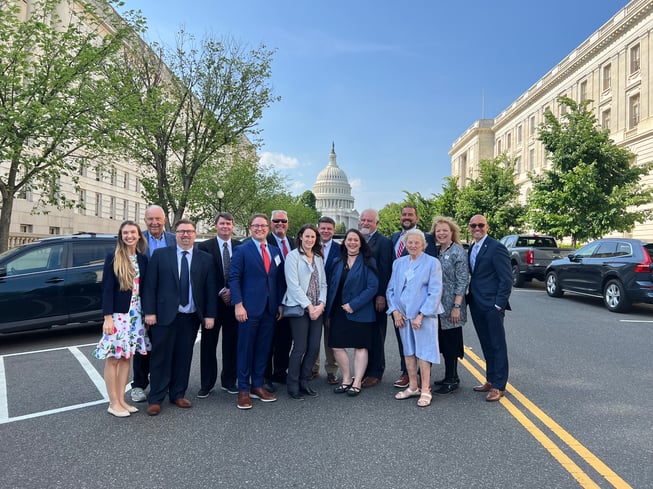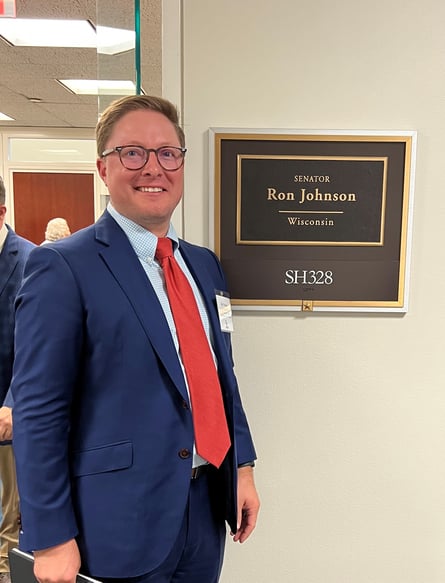
Remember the anxiety of looking at your toilet paper supply thinking it wouldn’t last you through the week? Or mapping out the different stores you’d visit to track down TP like a general strategizing a battle plan?
It wasn’t long into the pandemic lockdown when our country felt the pressure of a constrained supply chain. When that pressure was at its highest, we looked to the trucking industry to provide society its most basic necessities.
And trucking came through for us.
While many attempted to master sourdough bread-making or botanical gardening at home, truck drivers were on empty roads moving trailers full of double ply (and food, water, medical supplies, lumber, etc.), keeping our country afloat.
The pandemic was a scary demonstration of just how reliant we are on the trucking industry and its wellbeing.
Here’s a scary update: the trucking industry is hurting.
Freight rates are down. Fuel is up. Drivers and mechanics are nowhere to be found. Equipment is expensive. So is the insurance. And to top it off…every other billboard on the interstate advertises an attorney that can help you win millions from a trucking company.
The industry needs help.
As part of the American Trucking Association’s "Call on Washington" (COW) grassroots lobbying effort, I recently went to Washington DC with the Wisconsin Motor Carriers Association to plead with our elected officials to step up. We met with the offices of seven Wisconsin congressmen and two senators, outlining some of the biggest issues the industry is facing and promoting legislation that’s drafted and ready to provide some relief.
Very rarely do you feel like you're part of the process when it comes to government & policy, but as we scrambled from office to office we all had the opportunity for our voices to be heard and share insights on how the industry challenges play out in the day to day efforts of running a trucking company. It was somewhat of a speed dating format where we had 30 minutes per visit and had to cut to the chase quickly, so we focused on four "buckets" of issues: workforce development, energy & environment, supply chain and lawsuit abuse.
Though I don't have firsthand experience running a trucking company, my day to day as a risk advisor and insurance broker gives me a direct line of sight to one of the biggest challenges in the industry: lawsuit abuse.
Lawsuit abuse is a broad topic, but the skinny is this: verdicts against trucking companies have ballooned in both size and frequency over the past 10+ years. And saying it's "ballooned" is underselling the severity when judgements have been awarded as high as a billion dollars in recent years. The big ones ($10M+) are referred to as nuclear verdicts and are the talk of the industry because, as the name would suggest, a judgement that large would likely wipe a truck company off the map. Less talked about but possibly more damaging to the industry is how frequent the $1M-$10M verdict occurs. The majority of motor carriers in this country only carry $1M in total limits, so a verdict of that size could be enough to decimate many companies hit with a verdict of that sum.
I had a very clear message to convey in DC… every single trucking leader I've talked to wants to see those effected by a trucking accident fairly compensated. Period. I've not met a single one who says otherwise. The problem is that the Trial Bar has shifted its focus from fair compensation to the bloated billboard sized numbers we've seen in the news - all under the guise of a virtuous mission to send a message to the industry and protect the motoring public.
It's nonsense. And it's a money grab. They see the industry as ripe for the taking and have gone so far as to partner with private equity who are financially backing trucking litigation because the payouts surpass what they can get elsewhere for far less work. I'll repeat that… private equity is financially backing trucking litigation for profit, taking a cut from actual victims.
Ultimately, we all feel the pain of the Trial Bar lining its pockets in pursuit of nuclear verdicts. For starters, the actual truck company that gets hit goes out of business because their liable for any sum above their insurance limits. In some cases, that's not a bad thing if the company is truly a bad actor and endangering the motoring public via gross negligence. In other cases, though, the loss is a result of a lapse in judgement from a driver over something that leadership has tirelessly tried to prevent via training, policy & disciplinary action.
Insurers are getting clobbered, too. They foot the bill for the first $1M and possibly more if the carrier buys excess insurance. For the insurers providing excess limits beyond the primary $1M, they may be on the hook for multiple millions. As a result of this trend, plenty of insurers have exited the transportation space or, if they choose to stay, have no choice but to drastically raise premiums to fund the losses.
That ends up affecting the industry as a whole as insurance goes up across the board. And for trucking, insurance is usually among the top 4 or 5 annual expenses - so those costs are far from marginal. As a result, everyday Joe & Jane consumer pays more for their goods.
And here's the real kick in the shorts: when insurance is unaffordable or unattainable, the motor carrier is less likely to carry higher limits, thus reducing the likelihood that proper funds are available for an actual victim of a serious trucking related crash. It comes full circle.
It's clear, this is a big problem. And it's impact is felt well beyond the actual bad actors in trucking. So how can our government step up and help? Well, at the state level, there have been a number of states that have addressed parts of the issue - Texas, Georgia and recently Iowa in a big way. For our efforts in DC at the federal level, we asked for our Wisconsin Representatives' support for the Highway Accident Fairness Act (H.R. 2936).
The Highway Accident Fairness Act addresses three components of the issue: 1) Any demand at or over $5M should be seen in federal court, 2) Third party litigating financing disclosure, 3) Staging a truck accident would be made a federal crime. In comparison to legislation passed in TX & IA, this bill is far less aggressive but does address aspects that seem like common sense. For starters, if a demand is made at or in excess of $5M, it's reasonable to think it should be treated seriously enough to be seen beyond a local court system. The third-party litigation financing disclosure is also fairly mild. It does not disqualify the act of third-party financing but instead demands a disclosure of that fact in court. If a jury is going to award a big sum of money, they should know part of the award will be paid to third party profiteers. Finally, as wild as it sounds, there isn't a federal crime for staging a trucking accident. There was recently an organized criminal effort in Louisiana that involved drivers staging accidents (as many as 150) and at least one attorney part of the scheme. As there is no federal crime against this, they were only punished by charging them with mail fraud. This bill would change that.
After going through the different aspects of lawsuit abuse and outlining the proposed legislation in all nine of our meetings, I’m not entirely sure what the result was of our grassroots lobbying effort. It was tough to tell. And I’m guessing that’s a normal feeling for those who work in politics.
At times we educated. At times we added context. And at times we added personal stories that they might playback when they have a chance to support legislation that can help the industry. The hope is that our voices, the voices of people who see the day-to-day challenges, carry just a little more weight than the policy briefing that gets piled on their desk and that they heard one or two things that motivates action.
None of us involved in the Call on Washington thought that our voices alone would save the industry or change the world. That’s just not how the system works. But dang, was it cool to step up and do a small part. Especially when it wasn’t long ago that the industry stepped up in a big way for all of us.
At a time when trucking is going through such hard times, joining this effort & fighting for the industry was among the most rewarding professional experiences of my career. Now that I’ve got my first taste of ‘fighting the good fight’, I can’t wait to go back and take another crack at it!

Zach is a Risk Advisor and insurance broker specializing in the transportation industry. In working with transportation companies throughout the country, Zach works closely with clients to identify risk and exposure within their operation and build focused strategy to improve. He has experience working with companies on creative risk financing solutions and strategic insurance execution. He is involved with local and state industry associations and an advocate for the trucking industry.
.png?width=69&height=53&name=Acrisure%20Logo%20(White%20Horizontal).png)

